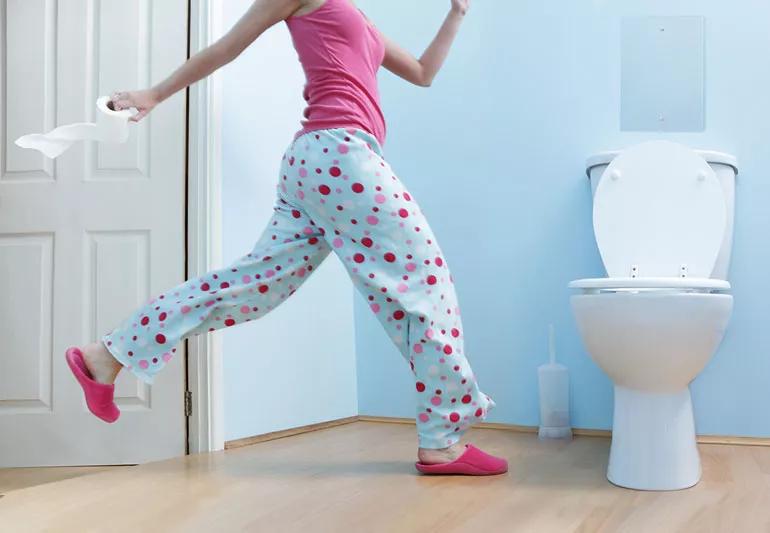Your #2 can be the #1 sign of a medical issue

When you look in the toilet after you poop, you may find something unexpected: Key pieces of information about your health.
Advertisement
Cleveland Clinic is a non-profit academic medical center. Advertising on our site helps support our mission. We do not endorse non-Cleveland Clinic products or services. Policy
The shape, color and smell of your bodily waste can signal if something inside of you isn’t operating at 100% efficiency. Hard, lumpy doo-doo may mean you’re dehydrated, for instance. Red stool? That may be a sign of rectal bleeding. A pungent poop could indicate an infection or other concerns.
Basically, there’s a treasure trove of information for those willing to take a peek. You just have to know what you’re looking for.
Let’s get to the bottom of it with gastroenterologist Christine Lee, MD.
Poop isn’t exactly a one-size-only personal product. Your fecal matter can be big or little depending on the day. It can be round or oblong. It can be hard or soft or even liquid in form. There’s a lot of potential variation.
Luckily, there’s a handy visual aid to give you a sense of what’s ideal and what’s not.
The Bristol Stool Chart classifies feces into seven types based upon shape and consistency, says Dr. Lee. The types are as follows:
Advertisement
So, what type should you be hoping to find in the bowl? “Type 3 or Type 4 is optimal and reflective of a healthier diet and lifestyle,” says Dr. Lee. (As an added bonus, those types of poo also are easier to pass.)
The other five types may be signaling that something is off internally. For instance:
Before we explore the fascinating world of “technicolor” poop, let’s start with what hue it should be — a basic brown. That ho-hum color comes from mixing various ingredients sloshing around in your digestive tract, including:
So, what makes a wild color appear from time to time? It’s usually tied to something that you ate. Vegetables, fruits and food dyes can all paint your poop — and it’s perfectly normal (even if it doesn’t look like it).
Know this, though: A food-related tint should disappear within a day or so once the source is out of your system
If odd colors linger, it could be a warning sign for other medical issues. For instance:
Advertisement
Most of the time, though, a funky color can be traced back to food. (Hello, green-frosted cupcake!) But if your poo stays on the wrong part of the color chart for more than a few days, contact your healthcare provider.
There’s no air freshener promising to deliver the pleasant aroma of fecal matter. Poop smells bad. That’s just a basic fact.
But there is poo that smells worse than bad — and that’s where you want to pay attention.
Foul-smelling poop is often connected to unwanted bacteria taking up residence in your gut and upsetting your usual digestive process, says Dr. Lee. That strong smell is often in conjunction with diarrhea, too.
Symptoms should clear up quickly if the smell is because of something you ate. If the issue lingers, though, touch base with your healthcare provider to see if there’s an underlying medical condition behind the smell.
Is it good to pay attention to your output in the bathroom? Absolutely. But it’s also not something that demands constant, thorough review. You’ve been pooping your whole life. When something’s wrong, you’ll know.
“It shouldn’t be a daily concern,” says Dr. Lee. “But when something seems off, don’t just ignore it. Listen to what your body is telling you.”
Advertisement

Sign up for our Health Essentials emails for expert guidance on nutrition, fitness, sleep, skin care and more.
Learn more about our editorial process.
Advertisement

There’s usually a simple answer, like what you ate, but the color can also be a cause for concern

Excess mucus, ulcers, a high-fat diet and pancreatic conditions can make stool sticky

Diet offers a rainbow of possibilities when it comes to the hue of your stool

If it’s brown, yellow or green, there’s typically no need to worry, but call your pediatrician if your little one’s stool is red, black or white

Everyone poops, but here’s what may affect how often you visit the toilet

The caffeine and natural acids in coffee may trigger acid reflux, but there are ways to lessen the effects

Even small moments of time outdoors can help reduce stress, boost mood and restore a sense of calm

A correct prescription helps your eyes see clearly — but as natural changes occur, you may need stronger or different eyeglasses

Both are medical emergencies, but they are very distinct events with different causes